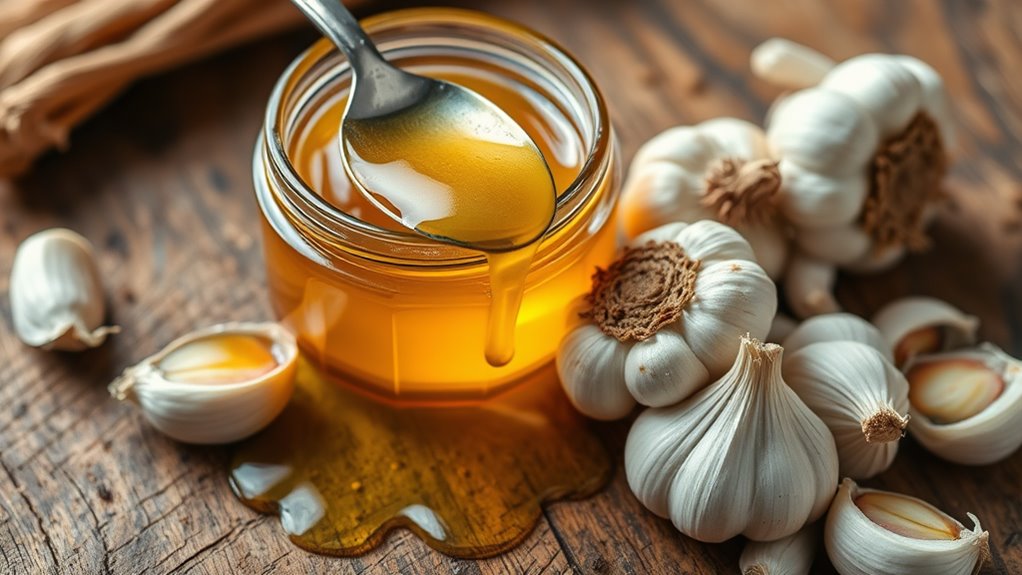DIY Herbal Syrup That Kicks Out Cough Naturally
When you’re dealing with a stubborn cough, turning to nature can be your best bet. DIY herbal syrups offer a gentle, effective way to soothe your throat and support your immune system. With simple ingredients like honey, ginger, and thyme, you can create a remedy that not only tastes good but also promotes healing. Curious about how to make your own syrup and what benefits each ingredient brings? Let’s explore the process together.
Key Takeaways
- Gather natural ingredients like honey, ginger, garlic, and herbs to create a soothing herbal syrup for cough relief.
- Combine herbs with water in a saucepan and simmer for 20-30 minutes to extract beneficial properties.
- Strain the mixture, then mix in honey for sweetness and added antibacterial benefits.
- Store the syrup in a dark glass jar, tightly sealed, to maintain freshness and potency.
- Administer 1-2 tablespoons for adults or 1 teaspoon for children every 4-6 hours until symptoms improve.
Understanding the Benefits of Herbal Cough Syrups
Herbal cough syrups offer a natural alternative to conventional medications, harnessing the power of plants to soothe your throat and ease coughing.
These syrups often contain ingredients like honey, ginger, and various herbs known for their anti-inflammatory and antibacterial properties.
By choosing an herbal cough syrup, you’re not just alleviating symptoms; you’re also supporting your body’s natural healing process. Many find these remedies gentler on the stomach and free from harsh chemicals, making them suitable for all ages.
Plus, the flavors can be comforting, turning your cough relief into a pleasant experience rather than a chore. Additionally, honey’s natural antimicrobial properties can help combat infections while providing immediate throat relief.
Essential Ingredients for Your Herbal Syrup
Creating your own herbal syrup can be a rewarding experience, and choosing the right ingredients is key to its effectiveness.
Start with honey, a natural sweetener that soothes the throat and has antibacterial properties. Add fresh ginger for its anti-inflammatory benefits, and garlic for its immune-boosting qualities.
Begin with honey for its soothing and antibacterial properties, then mix in fresh ginger and garlic for added health benefits.
Include herbs like thyme or sage, known for their expectorant effects. Don’t forget lemon juice, which enhances flavor and provides vitamin C.
Lastly, consider adding cinnamon for its warming properties. Together, these ingredients create a powerful blend that not only tastes great but also supports your body in fighting off coughs naturally. Additionally, honey acts as a natural cough relief remedy, making it an essential component in your herbal syrup.
Step-by-Step Guide to Making the Syrup
Start by gathering all your ingredients and tools, as having everything on hand will make the process smoother. Here’s a simple step-by-step guide:
| Step | Action |
|—————-|——————————————-|
| 1 | Combine herbs and water in a saucepan. |
| 2 | Simmer on low heat for 20-30 minutes. |
| 3 | Strain the mixture and add honey or sugar. |
Once you’ve completed these steps, let your syrup cool. You can adjust sweetness to taste, making it not just effective but enjoyable! Remember that using honey can also soothe your throat while enjoying your natural remedy for cough relief.
How to Properly Store Your Herbal Syrup
After you’ve made your syrup and allowed it to cool, it’s important to store it properly to maintain its potency and flavor.
Proper storage of your herbal syrup is crucial for preserving its potency and flavor after cooling.
To keep your herbal syrup fresh and effective, follow these simple tips:
-
Use a dark glass jar to protect it from light.
-
Seal tightly to prevent air exposure.
-
Store in a cool, dark place, like a pantry.
-
Label with the date to track freshness.
-
Refrigerate if you plan to keep it for more than a few weeks. Additionally, consider adding natural essential oils to enhance flavor and aroma while preserving the syrup’s effectiveness.
Dosage Recommendations for Effective Use
When it comes to using your homemade herbal syrup for cough relief, finding the right dosage is key to its effectiveness. Generally, adults can take 1-2 tablespoons every 4-6 hours, while children aged 2-12 should have 1 teaspoon. Adjust as needed based on age and severity of symptoms. Herbal teas can reduce the duration and severity of cold symptoms, making them a great complementary treatment.
| Age Group | Dosage |
|—————-|———————|
| Adults | 1-2 tablespoons |
| Children (2-12)| 1 teaspoon |
| Infants (under 2)| Consult a doctor |
| Frequency | Every 4-6 hours |
| Duration | Until symptoms improve|
Stay consistent for the best results!
Other Natural Remedies to Complement the Syrup
Incorporating additional natural remedies can significantly enhance the effectiveness of your herbal syrup for cough relief.
Try these remedies alongside your syrup for a holistic approach:
-
Honey: A soothing agent that coats your throat, easing irritation.
-
Ginger Tea: Its warming properties can help reduce inflammation and promote comfort.
-
Steam Inhalation: Breathing in steam can relieve congestion and open airways.
-
Throat Gargle: Saltwater gargles act as a natural disinfectant, easing throat pain.
-
Warm Broths: Nourishing and hydrating, they provide comfort and support your immune system.
Additionally, staying hydrated is crucial during recovery to help relieve throat discomfort and promote overall health. Embrace these remedies for a more comprehensive healing experience!
Tips for Preventing Coughs Naturally
How can you keep coughs at bay naturally?
Start by boosting your immunity with a balanced diet rich in fruits and vegetables. Incorporate foods high in antioxidants, like berries and leafy greens.
Stay hydrated to keep your throat moist and reduce irritation. Regular exercise strengthens your respiratory system, while stress management techniques, like yoga or meditation, help maintain overall wellness.
Avoid irritants such as smoke or strong fragrances, and ensure good air quality in your home with proper ventilation. Lastly, make sure to get enough sleep; rest is crucial for your body to fight off infections.





